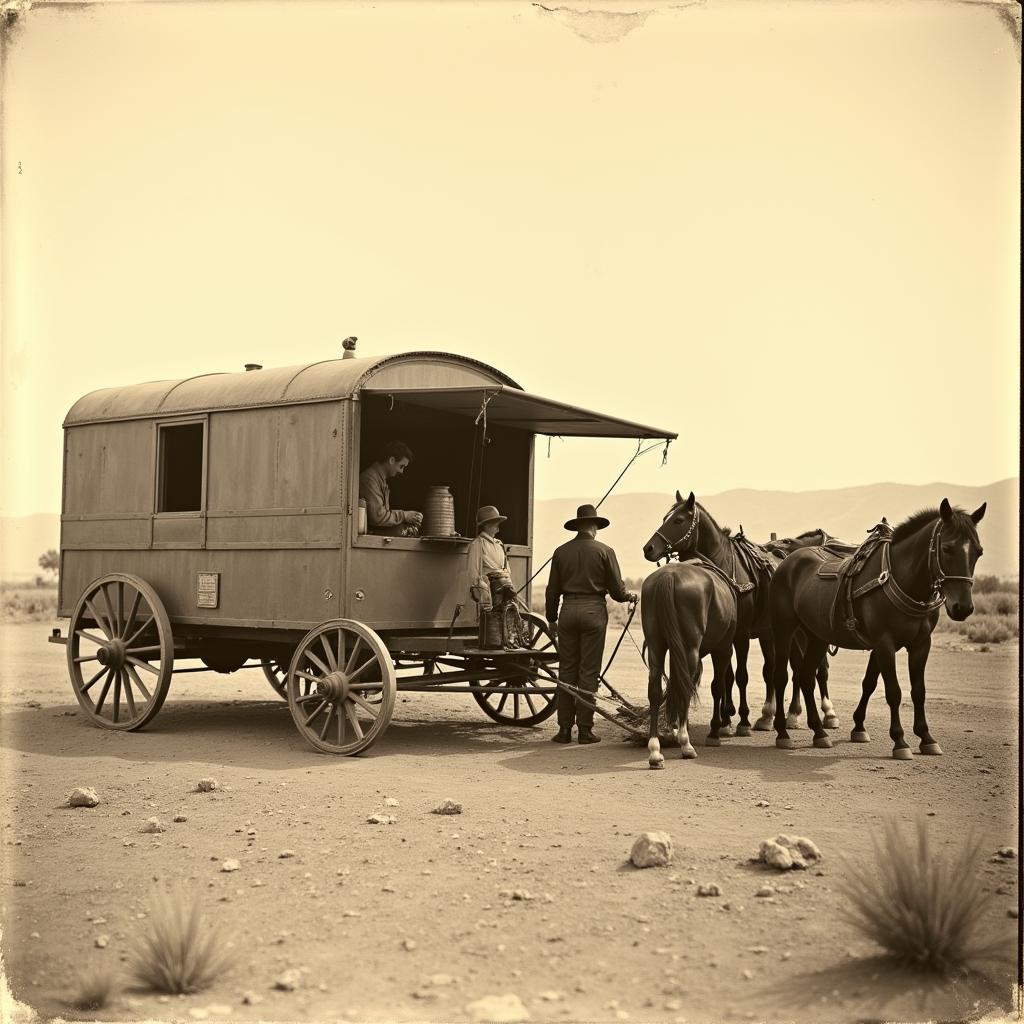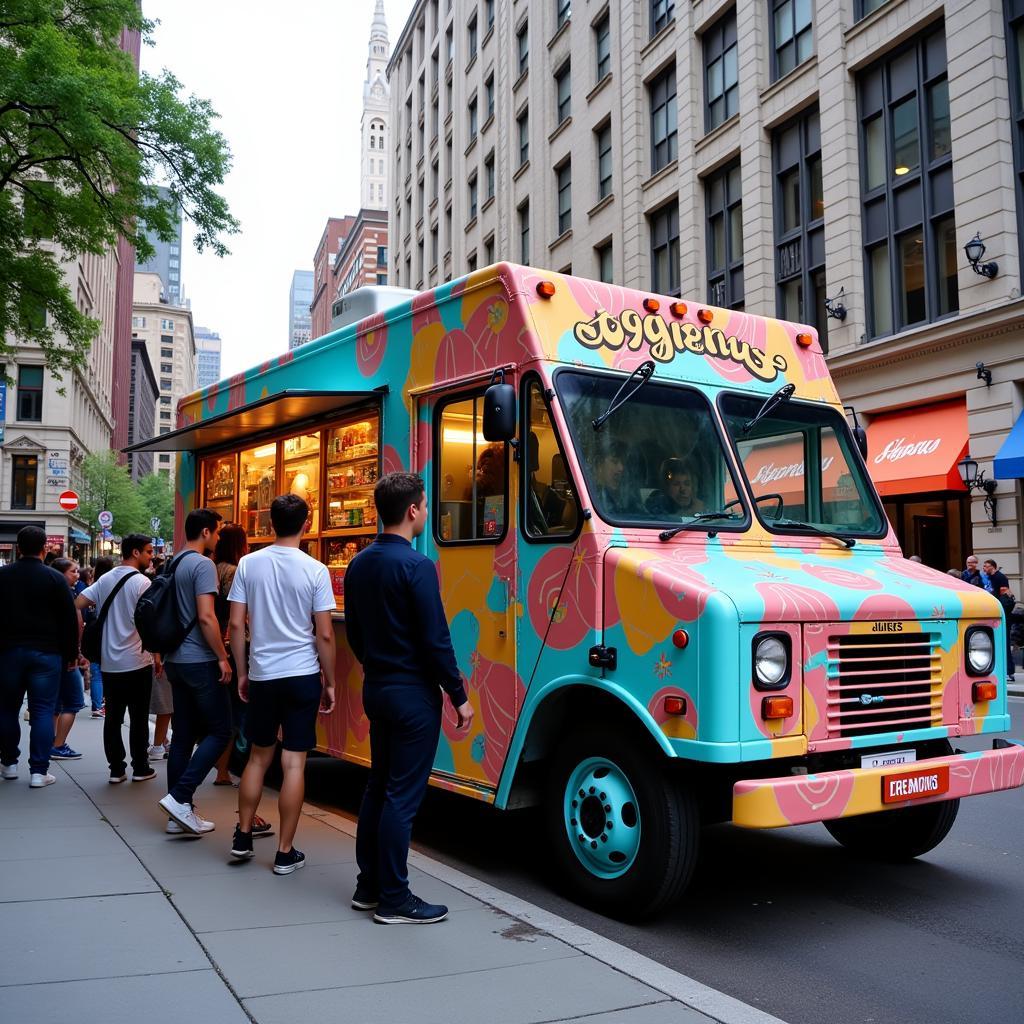The Food Truck Timeline is a fascinating story of culinary innovation and entrepreneurial spirit. From humble beginnings as chuck wagons in the Wild West to today’s gourmet mobile kitchens, food trucks have evolved significantly, shaping the culinary landscape and offering diverse dining experiences. Let’s delve into this captivating journey, exploring the key milestones and trends that have defined the food truck industry.
 Chuck Wagon in the Wild West – The Origins of Food Trucks
Chuck Wagon in the Wild West – The Origins of Food Trucks
The Early Days: From Chuck Wagons to Mobile Lunch Counters
The food truck timeline begins in the late 1860s with the chuck wagon, essentially a mobile kitchen designed to feed cowboys during long cattle drives across the American West. These rudimentary kitchens on wheels provided sustenance and comfort on the trail, laying the groundwork for the modern food truck. Then, in the late 19th and early 20th centuries, lunch wagons appeared in urban areas, catering to factory workers and office employees with quick, affordable meals. These early mobile eateries laid the foundation for the modern food truck, demonstrating the inherent demand for convenient and accessible dining. Check out our food truck history timeline for a more in-depth exploration of this era.
Rise of the “Roach Coaches” and Early Specialization
By the mid-20th century, mobile food vendors, often referred to as “roach coaches,” became a common sight near construction sites and industrial areas. While not always glamorous, they provided a vital service to a hungry workforce. Simultaneously, early forms of specialized food trucks emerged. Ice cream trucks, with their catchy jingles, became synonymous with summertime treats, while taco trucks started gaining popularity, particularly in Southern California.
The Gourmet Food Truck Revolution
The late 2000s marked a turning point in the food truck timeline. The rise of social media, coupled with the economic downturn, created a perfect storm for the gourmet food truck revolution. Chefs, seeking more affordable and flexible options than traditional brick-and-mortar restaurants, took to the streets, offering innovative, high-quality cuisine from mobile kitchens.
Social Media and the Food Truck Boom
Social media played a pivotal role in this transformation. Food trucks leveraged platforms like Twitter and Facebook to announce their locations, menus, and specials, connecting directly with their customers and building loyal followings. This direct interaction and community building are key components of the modern food truck experience. Thinking about a unique dessert option for your special day? Explore our dessert food trucks for weddings for some sweet inspiration.
 Gourmet Food Truck in a Modern Cityscape
Gourmet Food Truck in a Modern Cityscape
The Modern Food Truck Landscape
Today, the food truck industry is a vibrant and diverse sector of the culinary world. From Korean BBQ tacos to vegan ice cream, food trucks offer a vast array of cuisines, reflecting the multiculturalism and evolving tastes of modern society. Food trucks have become integral parts of community events, festivals, and even weddings, offering a unique and flexible catering option. If you’re looking to start your own food truck adventure, take a look at our food trailer for sale orlando and food trailer for sale okc listings. We also offer a range of vintage food vans for sale for those seeking a classic touch.
Conclusion: The Future of Food Trucks
The food truck timeline is a story of constant adaptation and innovation. From its humble beginnings to its current status as a culinary force, the food truck has continuously evolved, reflecting societal shifts and changing consumer demands. The future of the food truck industry promises even more exciting developments, with technology, sustainability, and community engagement playing key roles in shaping the next chapter of this delicious journey.
FAQ
- What were the first food trucks? Chuck wagons in the Wild West
- When did gourmet food trucks become popular? The late 2000s
- How has social media impacted the food truck industry? Facilitated direct communication with customers and location announcements.
- What are some popular food truck cuisines? Korean BBQ, tacos, vegan ice cream, and many more.
- Where can I find food trucks near me? Use social media and food truck finder apps.
- What are the advantages of hiring a food truck for an event? Flexibility, unique dining experience, and diverse cuisine options.
- How do I start my own food truck business? Research local regulations, secure funding, and develop a strong business plan.
For any assistance, please contact us at Phone Number: 02437655121, Email: minacones@gmail.com Or visit us at: 3PGH+8R9, ĐT70A, thôn Trung, Bắc Từ Liêm, Hà Nội, Việt Nam. We have a 24/7 customer service team.